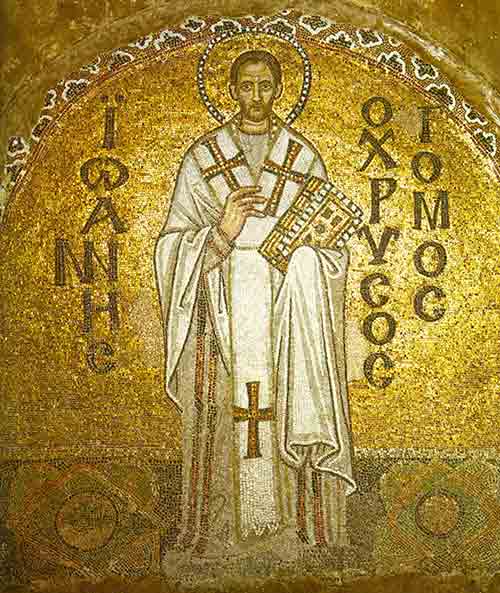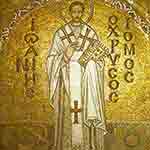
This post is part 3 of a series which began with
Baptised in Paul’s Name (Part 1) and
Baptised in Paul’s Name (Part 2)
I feel like I need to restate each time – this study is not advocating for a change from our ecumenically-agreed practice of baptising with a verbal, formulaic proclamation “…in the Name of the Father, and of the Son,…”. This study is simply saying that we have not always baptised like this. We did not baptise like this in the New Testament period. We did not baptise like this in the Early Church.
J. D. C. Fisher reports that the “passive” Trinitarian formula used in the East is attested at least as early as one of John Chrysostom’s baptismal catecheses (delivered at Antioch in 390).
I set myself the challenge that ” It would be fun to look at that late-fourth-century catechesis (in the original).”
And, I found what I was looking for. It is in St John Chrysostom’s Second Baptismal Instruction, specifically section 26:
Καὶ ἵνα μάθῃς καὶ ἐντεῦθεν ὡς μία ἡ οὐσία Πατρὸς καὶ Υἱοῦ καὶ ἁγίου Πνεύματος, οὕτω καὶ ἡ τοῦ βαπτίσματος γίνεται παράδοσις.
Ἐπιφωνοῦντος γὰρ τοῦ ἱερέως·
«Βαπτίζεται ὁ δεῖνα εἰς τὸ ὄνομα τοῦ Πατρὸς καὶ τοῦ Υἱοῦ καὶ τοῦ ἁγίου Πνεύματος», τρίτον τὴν κεφαλὴν καθίησι καὶ ἀνίησι, διὰ τῆς μυστικῆς ταύτης τελετῆς τὴν τοῦ Πνεύματος παρασκευάζων ἐπιφοίτησιν δέξασθαι.
And in order that you (singular) might learn also that the substance of the Father and the Son and the Holy Spirit is one, Baptism is bestowed by the priest saying loudly (Ἐπιφωνοῦντος): “So-and-so (δεῖνα) is baptised in the name of the Father and of the Son and of the Holy Spirit.” Three times the head is lowered…
Here is where I might upset people.
So, at the end of the fourth century, we have the first evidence, at the liturgy of baptism, of saying aloud: “…in the name of the Father and of the Son and of the Holy Spirit.” But, I am going to claim that we are still reading this text of 390 AD anachronistically.
Yes, the priest says these words loudly – I can make no other interpretation of Ἐπιφωνοῦντος, can you?
But we currently, East and West, have an understanding of the words “…in the name of the Father and of the Son and of the Holy Spirit” as being required to be said aloud in this manner in order to have a valid baptism.
My contention is that there is no evidence in John Chrysostom’s text that he views it in this way at all.
I am going to make my case with reference to the NZ Anglican baptismal rite. At the moment of baptism for each individual, the people proclaim aloud: “God receives you by baptism into the Church.”
Now, no one would see these particular words as being essential for the validity of baptism. The words were there in 1987 but not in 1976 or previously. Nor are they found in the way others do baptism in other places.
But, you can imagine that people might come to really like these particular words – and the practice of saying them, at the moment of baptism, could spread to other traditions and other places.
That is what I am suggesting is a better way to see the words in John Chrysostom’s homily. These were words (“So-and-so is baptised in the name of the Father and of the Son and of the Holy Spirit.”) that people appreciated being proclaimed at the moment of baptism. We have already shown they were not used in the New Testament period nor in the earliest church. There is no evidence of them being used elsewhere at the end of the fourth century. There is certainly no suggestion that they are the “form” of baptism (a 13th century concept) nor that they are a requirement for the baptism to be “valid”. All that would come later.
If you appreciated this post, consider liking the liturgy facebook page, using the RSS feed, and/or signing up for a not-very-often email, …




Bosco, have we shown that this formula was not used in the early days of Christianity or have we simply not found evidence that it was used? (A small point, but I’m curious.)
Of greater interest to me would be to learn which denominations require the ecumenical formula. Do many denominations insist on the formula for a ‘valid’ baptism? (Leaving aside ‘baptism of blood’ and all.)
We have shown, Kevin, that in the tradition of Justin Martyr it was not used. And we have no clear record of it being used.
My understanding is that, for example, Roman Catholicism would hold baptism to be valid even if the precise formula (“form”) wasn’t followed if the agreed intention was present, and the church is Trinitarian. This fits with the direction that this series has been developing. Ie. RCs would see baptism, as described by Justin, as valid.
I would think a lot of individuals would “conditionally” baptise. I have done this myself.
Blessings.
>>But we currently, East and West, have an understanding of the words “…in the name of the Father and of the Son and of the Holy Spirit” as being required to be said aloud in this manner in order to have a valid baptism.
I’m not sure that is true Bosco. For a licit (legally complying) baptism, yes, but for a valid baptism I don’t know where that has ever been formally defined. And the ancient Church certainly knew of other forms eg baptism by desire, by blood. Everyone in heaven, and most there were not baptised by water, is by definition a member of the Church (Triumphant) and hence baptised (in some sense). God is not bound by his (sic) sacraments (Aquinas, Vatican II).
>>We have already shown they were not used in the New Testament period nor in the earliest church.
With all due respect Bosco, I have missed where you have shown that Bosco; argued and suggested, yes, but shown ?
Many Blessings
Thanks, Chris.
You would have to take up your first point with, for example, with the Roman Catholic Congregation for the Doctrine of the Faith and the Pope who are clear that this is required for valid baptism.
Your second point is arguing backwards from the understanding that baptism is required for going to heaven – therefore all those who are in heaven are “baptised (in some sense)”. Again, I suggest, this is an anachronism.
Yes, your third point is, helpfully, calling for refinement: certainly, there may have been (unrecorded) areas where a verbal, formulaic proclamation “…in the Name of the Father, and of the Son,…” was used at the time of baptism. These posts are written for those who ‘have an understanding of the words “…in the name of the Father and of the Son and of the Holy Spirit” as being required to be said aloud in this manner in order to have a valid baptism’ (eg. the document in response to your first point). You indicate that you are not coming from this perspective – so you have accepted the points of this series already.
Blessings.
I note, Bosco, that CDF responses to dubia are not formal definitions. Neither are they flavor of the month with the reigning pontiff 🙂
I have a healthy degree of skepticism for claims that certain sacraments are invalid. Safer to stay with “we are sure such and such a formula is valid”.
Many Blessings
I think, Chris, that in different ways we are making the same point.
Blessings.
Padre, where did this proclamation about a person’s baptism in the ACANZ&P baptismal liturgy come from?
Are you asking, David, which of the Prayer Book Commission’s members (or the subcommittees for it) came up with that particular line – I don’t know. Blessings.
No, I wondered if it was somehow related to/lifted from a similar type of pronouncement in any other setting by one of your church’s cultural streams.